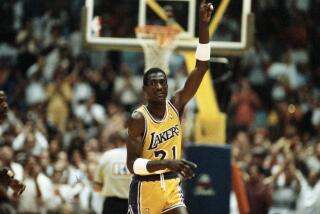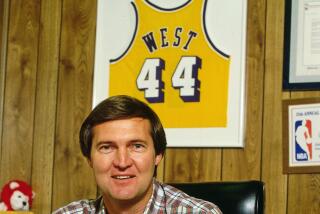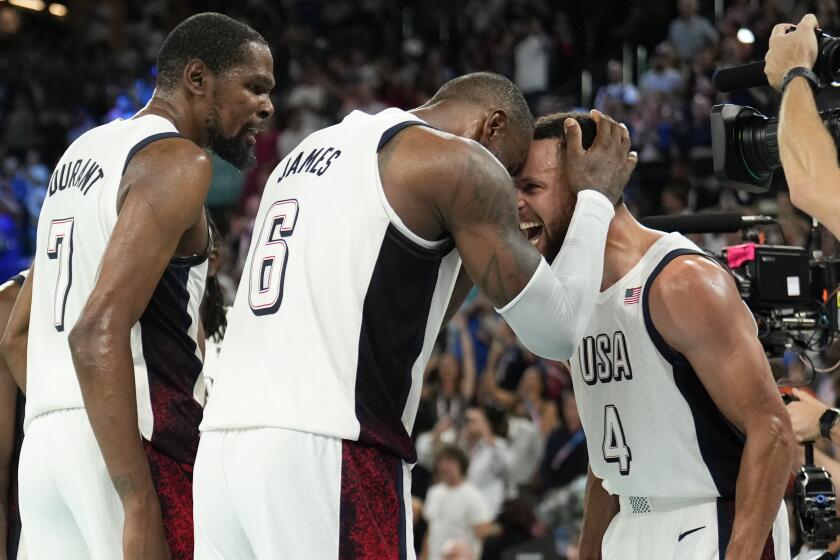Red Auerbach, 89; Celtics coach built a basketball dynasty
Arnold “Red” Auerbach, who built and sustained the Boston Celtics, professional basketball’s greatest dynasty, through meticulous scouting, innovative coaching, cunning deal-making and fiery leadership, died Saturday, said NBA spokesman Tim Frank. He was 89.
Auerbach reportedly died of a heart attack near his home in Washington, D.C.
For the record:
12:00 a.m. Nov. 8, 2006 For The Record
Los Angeles Times Wednesday November 08, 2006 Home Edition Main News Part A Page 2 National Desk 2 inches; 70 words Type of Material: Correction
Auerbach obituary: An obituary of Red Auerbach, former Boston Celtics coach and executive, in the Oct. 29 California section mischaracterized Larry Bird’s college playing experience when it said he had played a year at Indiana University. Bird won a scholarship to Indiana but left school during his first semester without having played for the basketball team. He later played three seasons at Indiana State before being drafted by the Celtics.
“Nobody has had as much impact on a sport as Red Auerbach had on the game of basketball. He was a pioneer of the NBA. He left his philosophy of winning championships, playing hard and playing as a team with several generations of players,” former Celtics coach and player Tommy Heinsohn told the Associated Press.
“He was relentless and produced the greatest basketball dynasty so far that this country has ever seen and certainly that the NBA has ever seen,” Bob Cousy, the Hall of Fame guard who played for Auerbach, told the AP.
A member of the Celtics organization for 55 years, Auerbach led the team to nine championships as a coach, including eight in a row, a streak unequaled by any other coach in any professional sport. Phil Jackson matched Auerbach’s nine championships when the Lakers won the title in 2002.
After moving full time into the front office, Auerbach went on to engineer seven more Celtics titles as the team’s general manager. The team said the upcoming season would be dedicated to Auerbach.
“Red had an unbelievable passion for winning,” Kevin McHale, a former Celtics player, told The Times. “Second place to him was like 28th place. It made no difference.”
Along the way, Auerbach became the first to pick an African American player in the NBA draft (Chuck Cooper in 1950), the first to start five black players in one lineup (1964) and the first to hire a black coach in the NBA (Bill Russell in 1966).
Auerbach’s teams built their dynasty by consistently denying the Lakers. Eight times over a 25-year period, from 1959, when the Lakers were still based in Minneapolis, through the 1983-84 season, the Lakers and Celtics met in the NBA Finals and eight times Auerbach and the Celtics emerged victorious.
Even in his declining years, Auerbach maintained his passion for the club.
“The Boston Celtics are not a basketball team,” he once said. “They are a way of life.”
His life.
Arnold Jacob Auerbach was born Sept. 20, 1917, in Brooklyn, N.Y. His father, Hyman, was a Jewish immigrant from Russia who married an office clerk, Mary Thompson. Red and his brothers worked in the family’s Brooklyn dry-cleaning business.
Auerbach left Brooklyn for George Washington University, where he played basketball for three years and earned a bachelor’s degree in education in 1940 and a master’s degree in education a year later.
He began his coaching career at the high school level and taught physical education and history.
In 1946, Auerbach became head coach of the Washington Capitols of the Basketball Assn. of America. He spent three seasons in Washington and one coaching the Tri-Cities Blackhawks. Auerbach became head coach of the Celtics for the 1950-51 season at a salary of $10,000.
Until the 1950 NBA draft, the league had left black players to the Harlem Globetrotters and their powerful owner and founder, Abe Saperstein. But once Auerbach and Celtics owner Walter Brown made the first move by choosing Cooper, the Washington Capitols chose Earl Lloyd in a later round. Lloyd became the first black to play in an NBA game, a few days before Cooper did.
Coaching was just one of Auerbach’s duties in an era in which teams couldn’t afford a staff of assistants, scouts, conditioning coaches and a large front office.
“If we had a game on a Wednesday and another on a Friday,” Auerbach told The Times in 2004, “I’d have practice on Thursday morning. Then I’d get on a plane and go to a college doubleheader in New York or Philly or wherever the games were.... And then, on top of that, I’d have my former players ... steer me on which players to see and which to not bother seeing.”
Along with a keen sense of talent and a broad network from which to glean the names of future stars, Auerbach was a master wheeler and dealer. He put together three crucial deals to first put the Celtics atop the basketball world and then to reinvent them several more times.
In 1956, Auerbach acquired Russell, a center who had excelled at the University of San Francisco and on the U.S. Olympic team at the Melbourne Games, by obtaining the first-round draft pick of the St. Louis Hawks for forward Cliff Hagan and center Ed Macauley.
Actually, it was more complicated than that. The Hawks had the No. 2 pick. The Rochester Royals had the first pick. So Auerbach persuaded Brown, the Celtics owner who also owned the Ice Capades, to offer several performances of the show to Lester Harrison, owner of the Royals, in exchange for Harrison’s agreement not to take Russell.
Auerbach got his man, and the Celtics went on to win 11 titles in 13 years with Russell at center, the last two with Russell serving as player-coach after Auerbach stepped down.
The Celtics struggled through much of the 1970s, but Auerbach reinvigorated the franchise by selecting a player named Larry Bird out of Indiana State. It would have been a no-brainer to select Bird in 1979 after he had led his team to the finals of the NCAA tournament. But by then it was too late.
Auerbach had gambled on Bird with the sixth pick of the 1978 NBA draft, knowing he would have to wait a year to sign the junior forward, but also knowing that it would be worth the lost year. No other team seemed to realize that Bird was eligible after having played a year at Indiana before transferring to Indiana State.
Auerbach completed the front court that would prove a dominating force in the 1980s by trading his first and 13th picks in the 1981 NBA draft to the Golden State Warriors for center Robert Parish and a selection he would use to get McHale.
Auerbach thought he had the core for yet another championship run when he used the second pick of the 1986 draft to select Len Bias, only to have Bias die of a cocaine overdose while celebrating his selection.
Although Auerbach had a knack for identifying athletes who would become stars, he preferred role players, those who valued winning over compiling individual honors.
“He was really enamored with putting players together to form a team,” McHale said. “He would say, ‘Wouldn’t you rather play with a guy who knows how to play and will play with you than a guy who is more talented, but selfish?’ ”
Auerbach’s Celtics were known for their playmaking offense, bruising defense, relentless rebounding and the sixth man, a fresh reserve who would come off the bench to give his team a boost.
Bob Cousy, Dave Cowens and John Havlicek were among those who thrived in that team environment.
“We have never had the league’s top scorer,” Auerbach said of the Celtics’ dominance. “In fact, we won seven league championships without placing even one among the league’s top 10 scorers. Our pride was never rooted in statistics.”
One of Auerbach’s players, Bill Sharman, who went on to coach the Lakers in 1971-72, their first championship season in Los Angeles, said he learned many of his techniques from Auerbach.
“He would do so many things to break up the monotony of practice,” Sharman told The Times. “He would match the biggest guys on the team in scrimmages with the smallest. And the losers would have to run laps, do push-ups or buy lunch.”
Among Auerbach’s honors were the designation on the NBA’s 35th anniversary team as “Greatest Coach in the History of the NBA,” membership in the Naismith Memorial Basketball Hall of Fame and awards for Coach of the Year and Executive of the Year. In 1985, on the occasion of Auerbach’s 68th birthday, a life-size sculpture of him, cigar in place, was unveiled in Boston’s Faneuil Hall Marketplace.
Auerbach and his late wife of 59 years, Dorothy, had two daughters. Because one of those daughters, Randy, suffered from asthma, the family never moved to the damp climate of Boston. Instead, they stayed in Washington all the years Auerbach was with the Celtics, with Red living in a Boston hotel.
In addition to his daughters, Randy Auerbach and Nancy Auerbach Collins, Auerbach is survived by a granddaughter and three great-grandchildren.
Auerbach was feisty to the end. Once asked if he looked back with favor upon those Lakers teams he had battled so ferociously as a coach, he replied, “They were the enemy then and they are the enemy now.”
*
More to Read
All things Lakers, all the time.
Get all the Lakers news you need in Dan Woike's weekly newsletter.
You may occasionally receive promotional content from the Los Angeles Times.









